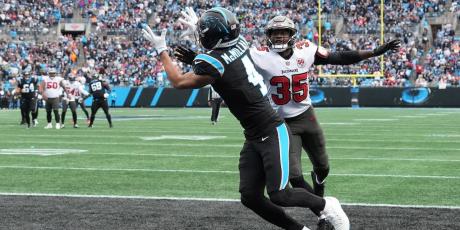The Impact of Changing Teams on WR Production

In fantasy football, conventional wisdom states that all else being equal a wide receiver who changes teams in the offseason is not going to perform as well as he did the year before. Not only does he have to get used to a new quarterback, he likely has to get used to a new offense as well. Of course, if the WR is going to have a big change in role -- such as Robert Meachem's move to San Diego this offseason -- then the change in scenery can be good for his production.
But what about the guy that Meachem is replacing -- Vincent Jackson? He joins a Tampa Bay team that doesn't have as potent of an offense as the Chargers do, and he'll also see a downgrade at quarterback from Philip Rivers to Josh Freeman. His production is not very likely to go up, but just how far will it drop?
To answer this question, I compiled data from 1990 to 2011, parsing out those wide receivers who changed teams after finishing in the top 36 in the previous season. I did this as part of a larger age study, so I also have subsets by age.
The table below shows the net difference from a total fantasy points standpoint and also from a fantasy points per game standpoint. It's important to note that, as a group, WRs who finished in the top 36 had a few things break their way. They will naturally score less (as a group) due to injury, TD regression and the progression of other players, which is why all the numbers are negative. It's important not only to look at those wide receivers who changed teams, but also those players who stayed with the same team so we can make a relative comparison.
| Same Team | Changing Teams | |||||||||||||
|---|---|---|---|---|---|---|---|---|---|---|---|---|---|---|
| Age | # | Net Diff | Total FP | % Change | FP/G Y1 | FP/G Y2 | % Change | # | Net Diff | Total FP | % Change | FP/G Y1 | FP/G Y2 | % Change |
| 25 | 61 | -1157 | 8425 | -14% | 9.1 | 8.2 | -10% | 4 | -252 | 448 | -56% | 7.1 | 5.7 | -20% |
| 26 | 74 | -1561 | 11034 | -14% | 9.4 | 8.6 | -8% | 9 | -169 | 1200 | -14% | 8.5 | 7.8 | -8% |
| 27 | 80 | -2442 | 11774 | -21% | 9.5 | 8.3 | -12% | 13 | -511 | 1653 | -31% | 8.6 | 6.3 | -27% |
| 28 | 72 | -2048 | 10984 | -19% | 9.6 | 8.0 | -16% | 9 | -370 | 1203 | -31% | 8.8 | 6.3 | -29% |
| 29 | 59 | -814 | 9086 | -9% | 9.5 | 8.9 | -7% | 6 | -294 | 810 | -36% | 8.8 | 6.0 | -32% |
| 30 | 63 | -1506 | 9774 | -15% | 9.7 | 8.6 | -11% | 9 | -453 | 1221 | -37% | 8.6 | 6.8 | -21% |
| 31 | 40 | -1279 | 6837 | -19% | 9.9 | 8.7 | -12% | 11 | -537 | 1464 | -37% | 8.5 | 5.9 | -31% |
| 32 | 37 | -823 | 5723 | -14% | 9.5 | 8.5 | -11% | 10 | -722 | 1431 | -50% | 9.2 | 5.0 | -46% |
| 33 | 20 | -857 | 3332 | -26% | 10.0 | 8.3 | -16% | 7 | -128 | 879 | -15% | 9.2 | 6.9 | -25% |
| 34 | 12 | -201 | 2332 | -9% | 9.8 | 9.2 | -6% | 6 | -252 | 792 | -32% | 8.3 | 7.2 | -14% |
| Total | 518 | -12688 | 79302 | -16% | 9.5 | 8.5 | -11% | 84 | -3687 | 11101 | -33% | 8.7 | 6.4 | -27% |
The columns are fairly self-explanatory, but "Net Diff" might be a bit confusing. It is simply the sum of the change in fantasy points year-over-year for players in that age group. "Total FP" is the sum of all fantasy points from the previous season for players in that age group, so "Net Diff" divided by "Total FP" gives us the total percentage drop ("% Change").
On the whole, receivers who stayed with the same team saw their total fantasy points drop by 16%. Those wide receivers who changed teams saw their fantasy points drop by 33%, so there's a relative difference of 17%.
It's also interesting to look at the numbers on a per game basis (FP/G). The receivers that stayed on the same team saw their points per game drop by 1.0 points (or 11%). Meanwhile, those wide receivers that changed teams saw their points per game drop by 1.7 points (or 27%). That’s a relative difference of 16%. Whether we're looking at total fantasy points or per game averages, the relative drop is about the same.
So in this case the conventional wisdom holds -- unless they're going to see an increase in targets or more efficient quarterback play, receivers who change teams are a lot more likely to see a drop in production than their counterparts who stay put.
But back to Vincent Jackson… He may very well outproduce his 2011 numbers, which made him the #10 WR on the year. But he's more likely to regress, and at a rate that's higher than those players who stayed with the same team. A 33% drop would put his total fantasy points at about 114 for the season. Those were WR31 numbers in 2011. If we assume that he bucks the trend of naturally regressing as a top 36 receiver and only suffers a drop due to his change in scenery, that would put him at around 143. We currently project him to score 151 points, and given the relative depth at receiver, it makes him our #25 WR.
4for4.com is home to the most accurate fantasy football experts in the world. We deliver all the information and tools needed to help you make winning decisions, both on draft day and during the season. Our subscribers win thousands of fantasy football leagues each year, so see what they're saying, find out more about what we offer, and sign up when you're ready to join them in the winner's circle.












